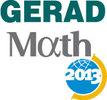HEC Montréal, Canada, 6 - 8 mai 2013
Journées de l'optimisation 2013
HEC Montréal, Canada, 6 — 8 mai 2013

MB5 Optimisation sans derivées II / Derivative-Free Optimization II
6 mai 2013 15h30 – 17h10
Salle: CPA du Québec
Présidée par Charles Audet
4 présentations
-
 15h30 - 15h55
15h30 - 15h55Approximating Normal Cones for Constrained Optimization
Normal cones provide powerful information about projections, tangent directions, and stopping conditions in constrained optimization. When the constraint set is defined through a collection of (well-behaved) analytic functions, normal cones are easily computed. In this talk we consider the situation where the constraint set is provided through an oracle function or collection of oracle functions. Methods for approximating normal cones under these conditions are provided and compared.
-
 15h55 - 16h20
15h55 - 16h20Directional Direct-Search Optimization with Polling Directions Based on Equal Angle Distributions
We consider new instances of MADS/GSS algorithms which emphasize uniform distributions of search directions. We utilize minimal or maximal positive bases having equal, or nearly equal, angle distributions. The goal is performance enhancement for high-dimensional constrained problems. Results and comparisons are presented for a variety of test problems.
-
 16h20 - 16h45
16h20 - 16h45Pairing Derivative-Free Optimization and Sensitivity Analysis Using a Hybrid Framework
Because each optimization method has inherent strengths and weaknesses, picking a suitable algorithm is quite challenging and has been the subject of many studies and much debate. In order to take advantage of the benefits of more than one approach and to try to overcome their shortcomings, two or more methods may be combined, forming a hybrid. In this talk, we will discuss a hybrid software framework and give some examples of its use. We will also explain how it can be used to incorporate sensitivity studies into a derivative-free optimization process in order to describe some of the uncertainties associated the suggested solutions.
-
 16h45 - 17h10
16h45 - 17h10Reducing the Number of Function Evaluations in Mesh Adaptive Direct Search Algorithms
We propose strategies to improve the efficiency of MADS algorithms by reducing the maximal number of trial points at each iteration without impacting the quality of the solution. We devise various strategies, embedded in a generic algorithmic framework, that order the trial points in such a way that the promising points are evaluated first, and the unpromising points are discarded and replaced by a single point. A crucial element is that the proposed methods retain the hierarchical nonsmooth convergence analysis.

